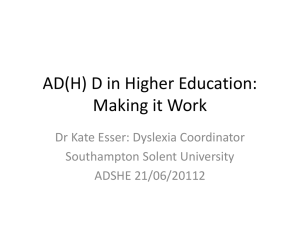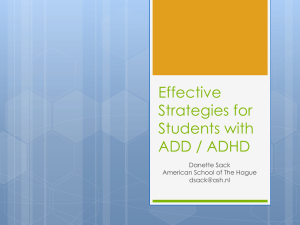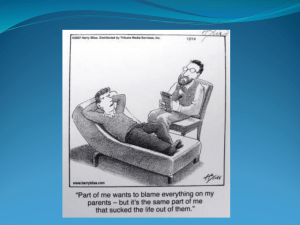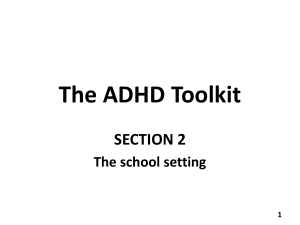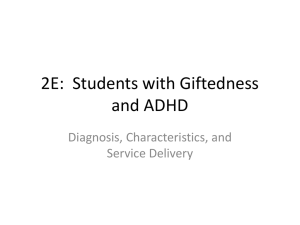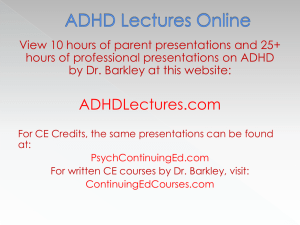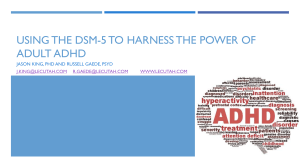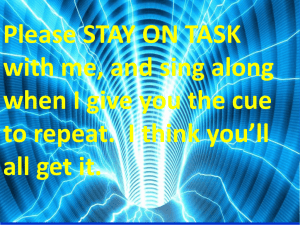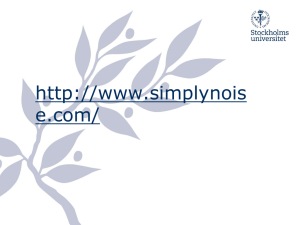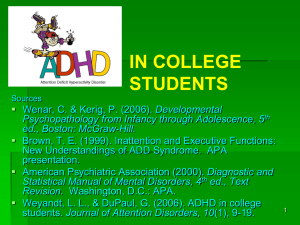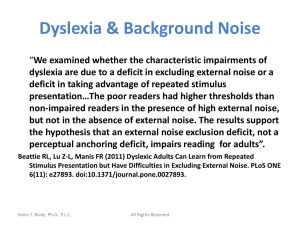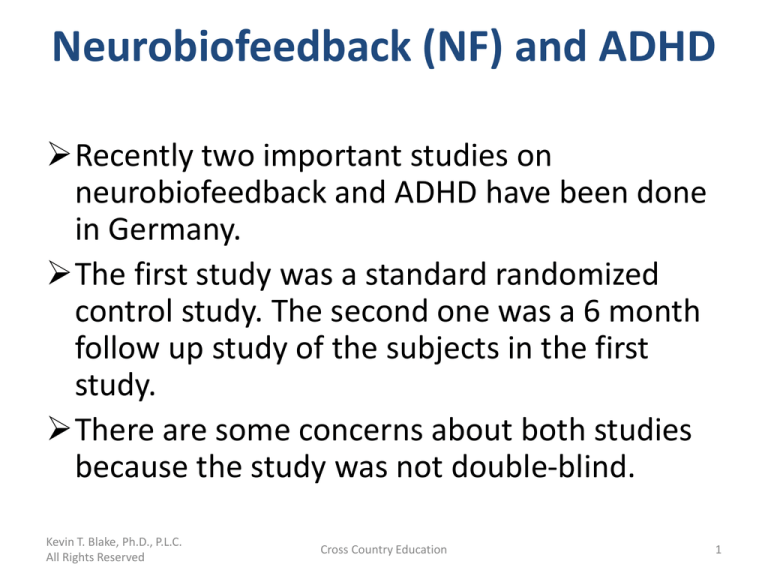
Neurobiofeedback (NF) and ADHD
Recently two important studies on
neurobiofeedback and ADHD have been done
in Germany.
The first study was a standard randomized
control study. The second one was a 6 month
follow up study of the subjects in the first
study.
There are some concerns about both studies
because the study was not double-blind.
Kevin T. Blake, Ph.D., P.L.C.
All Rights Reserved
Cross Country Education
1
Neurobiofeedback (NF) and ADHD
The researcher of these studies wrote:
“”A reduction of at least 25% in the primary outcome
measure (responder criterion) was observed in 50%
of the children in the NF group. In conclusion,
behavioural improvements induced by NF training in
children with ADHD were maintained at a 6-month
follow-up. Though treatment effects appear to be
limited…NF may be recommended as a treatment
module for children with ADHD besides conventional
and behavioural training and medication.” (p. 715
and 722) (May, 2010 article)
Kevin T. Blake, Ph.D., P.L.C.
All Rights Reserved
Cross Country Education
2
Neurobiofeedback (NF) and ADHD
Gevensleben, H., Holl, B.,Albrecht, B., Vogel, C.,
Schlamp, D., Kratz, O., Studer, P. Rothenberger A., Moll,
G.H., and Heinrich, H. (July, 2009). Is Neurobiofeedback
an Efficacious Treatment fro ADHD? A Randomized
Controlled Clinical Trial. Journal of Child Psychology
and Psychiatry, 50 (7), p. 767-768.
Fisher, C. (February 20, 2009). Children with ADHD
Realize Significant Benefits From Neurofeedback
Training In a Randomized Clinical Trial. The Behavioral
Medicine Report. From website:
www.bmedreport.com/archieves/1037.
Kevin T. Blake, Ph.D., P.L.C.
All Rights Reserved
Cross Country Education
3
Neurobiofeedback (NF) and ADHD
Gevensleben, H., Holl, B.,Albrecht, B., Vogel,
C., Schlamp, D., Kratz, O., Studer, P.
Rothenberger A., Moll, G.H., and Heinrich, H.
(May, 2010). Neurofeedback Training in
Children with ADHD: 6-Month Follow-up of a
Randomized Control Trial. European Child and
Adolescent Psychiatry, 19, 715-724.
Kevin T. Blake, Ph.D., P.L.C.
All Rights Reserved
Cross Country Education
4
Neurobiofeedback and ADHD
NIMH Pilot Study of Double-Blind Randomized
Control Neurobiofeedback Use with ADHD:
Conducted at the Nisonger Center at Ohio State
University
Gene Arnold and Nicholas Lofthouse, primary
investigators
Used Smartbrain Neurobiofeedback Technology
39 ADHD, 6 to 12 year olds randomly assigned to two
groups: (1) Sham Control and (2) Treatment
Abranwitz, A. , Lofthouse, N., deBeus, R., Hirshberg, L., and Barkley, R. (November
12, 2010). EEG Neurobiofeedback for ADHD: Review of Science, New Findings.
Paper and Symposium presented at the 22nd Annual CHADD Conference, Atlanta,
GA, Session FD10.
Kevin T. Blake, Ph.D., P.L.C.
All Rights Reserved
Cross Country Education
5
Neurobiofeedback and ADHD
NIMH Neurobiofeedback Pilot Study Results:
Retention rate 24 sessions 92%; 40 sessions 87%
Three treatments per week tolerated best
Twenty-four session optimal number
Abranwitz, A. , Lofthouse, N., deBeus, R., Hirshberg, L., and Barkley, R.
(November 12, 2010). EEG Neurobiofeedback for ADHD: Review of Science,
New Findings. Paper and Symposium presented at the 22nd Annual CHADD
Conference, Atlanta, GA, Session FD10.
Kevin T. Blake, Ph.D., P.L.C.
All Rights Reserved
Cross Country Education
6
Neurobiofeedback and ADHD
NIMH Pilot Study Results (Continued):
No difference between treatment and sham control
groups in parent and teacher ratings for ADHD,
hyperactive/impulsive symptoms, inattentive
symptoms, Oppositional Defiant symptoms, and
executive function symptoms.
The treatment group saw no change in their theta-beta
ratios.
Abranwitz, A. , Lofthouse, N., deBeus, R., Hirshberg, L., and Barkley, R. (November 12, 2010). EEG
Neurobiofeedback for ADHD: Review of Science, New Findings. Paper and Symposium presented
at the 22nd Annual CHADD Conference, Atlanta, GA Session FD10.
Kevin T. Blake, Ph.D., P.L.C.
All Rights Reserved
Cross Country Education
7
Neurobiofeedback and ADHD
NIMH Pilot Study Results (Continued):
Barkley stated after hearing the above data regarding what
clinicians should say to clients interested in pursuing
neurobiofeedback as a treatment for ADHD:
“The status of the evidence does not allow a
recommendation to be made (sic. For neurobiofeedback).
The clinician should give the information, but not render a
suggestion. Allow the client to use their own informed
consent.
Abranwitz, A. , Lofthouse, N., deBeus, R., Hirshberg, L., and Barkley, R. (November 12, 2010).
EEG Neurobiofeedback for ADHD: Review of Science, New Findings. Paper and Symposium
presented at the 22nd Annual CHADD Conference, Atlanta, GA, Session FD10.
Kevin T. Blake, Ph.D., P.L.C.
All Rights Reserved
Cross Country Education
8
Neurobiofeedback and ADHD
Barkley (continued):
The neurobiofeedback studies that have shown
treatment responses indicate the effect size of the
treatment is far lower than that of medication for
ADHD.
It has an effect size of other psychosocial treatments
for ADHD (i.e., parent training, classroom
management, etc.)
Abranwitz, A. , Lofthouse, N., deBeus, R., Hirshberg, L., and Barkley, R. (November 12, 2010). EEG
Neurobiofeedback for ADHD: Review of Science, New Findings. Paper and Symposium presented
at the 22nd Annual CHADD Conference, Atlanta, GA Session FD10.
Kevin T. Blake, Ph.D., P.L.C.
All Rights Reserved
Cross Country Education
9
Recent Review of Neurobiofeedback
Research Results with AD/HD
• Based on the results and methodologies of
published studies, this review concludes that
NF for pediatric ADHD can be currently
considered as “probably efficacious.”
Lofthouse, N, Arnold, E., Hersch, S. Hurt, E., and DeBeus, R. (November 16, 2011). A
Review of neurobiofeedback Treatment for Pediatric ADHD. Journal of Attention
Disorders. doi: 10.1177/1087054711427530 .
All Rights Reserved
Kevin T. Blake, Ph.D., P.L.C.
Recent Review of Neurobiofeedback
Research Results with AD/HD
According to Rabiner (January 2012). The “probably
efficacious” rating of the American Psychological
Association is the third highest rating out of a potential 5
levels research can obtain with 5 being the highest.
“Probably efficatious” means the research in question has,
“Shown to produce positive effects in more than one
clinical, observational wait list or within-subject or
between-subject study. When writing regarding the
Lofthose study (November 16, 2011). Rabiner stated,
“When averaged across the studies for which appropriate
outcome data was available, the overall mean effect size
(ES) was .79 for inattention measures, and .71 for
hyperactivity/impulsivity measures…”
All Rights Reserved
Kevin T. Blake, Ph.D., P.L.C.
Recent Review of Neurobiofeedback
Research Results with AD/HD
“…These are in a range that would be considered
'large' for inattention and 'moderate' for
hyperactivity/impulsivity and are below what is
typically reported for stimulant medication. Five of
the studies showed neurophysiological changes that
were specific to neurofeedback treatment. Overall,
these results are consistent with beneficial effects of
neurofeedback treatment for ADHD.”
Rabiner, D. (January, 2012). New Review of Neurobiofeedback Treatment for
ADHD-State of the Science. Attention Research Update. E-mail
newsletter: attentionresearchupdate@helpforadd.com.

